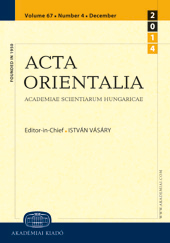Wang Anshi’s “Treatise on Great Men”
Wang Anshi’s “Treatise on Great Men”
Author(s): Thomas JülchSubject(s): East Asian Philosophy, Philosophy of Religion
Published by: Akadémiai Kiadó
Keywords: Wang Anshi; Neo-Confucianism; Buddhism; sages; trikāya-doctrine; Liezi;
Summary/Abstract: With his “Treatise on Great Men” Wang Anshi wrote a short yet sharp rejoinder contradicting a daring assumption formulated in previous Buddhist apologetic thought. Basing themselves on a famous passage in Liezi, chapter 4, Buddhist apologists claimed that the Confucian sages would not be real sages, while the only real sage would be the Buddha. Being an early representative of Neo-Confucianism, Wang Anshi in his treatise attacks this Buddhist apologetic position. In his counter-argumentation, he develops a system ascribing three different qualities to every sage. These are the qualities of ‘greatness’, ‘sageliness’, and ‘numinosity’. Wang Anshi implies that the Buddha mainly excels in numinosity, while Confucian sages mainly excel in greatness and sageliness. Since numinosity is regarded as the highest quality, he also stresses that the three qualities are all interconnected, so that also the Confucian sages are connected to numinosity. However, Wang Anshi’s main argument is that numinosity, though being the highest of the three qualities, does not benefit the common people. In order to benefit them, he says, one rather has to engage in practical action being represented by the qualities of greatness and sageliness. In the present paper I present both an analysis and a translation of Wang Anshi’s treatise.
Journal: Acta Orientalia Academiae Scientiarum Hungaricae
- Issue Year: 66/2013
- Issue No: 2
- Page Range: 197-204
- Page Count: 8
- Language: English
- Content File-PDF

